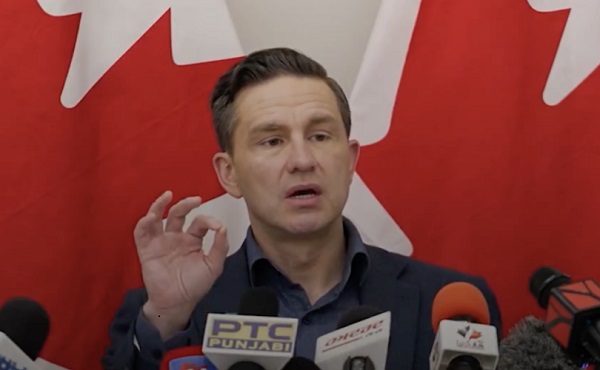Media
Poilievre vows to end mainstream media’s stronghold over Parliamentary Press Gallery

From LifeSiteNews
‘There is no reason why it should be a small cabal of government-approved mouthpieces.’
Canada’s Conservative Party leader Pierre Poilievre has promised to end the mainstream media’s stronghold over the Parliamentary Press Gallery, calling the current system “highly undemocratic” in which only a “small cabal of government-approved mouthpieces” are permitted membership.
“There is no reason why it should be a small cabal of government-approved mouthpieces,” Poilievre said in an interview with Juno News, calling the current system “highly undemocratic” and vowing to allow “independent media” in the “precinct.”
Poilievre remarked that the current situation in the press gallery has made it “particularly difficult for me because it means when I go and hold a press conference it’s just liberal media who are there to attend,” implying that the system itself contributes to political bias in news coverage.
Poilievre noted that he would “love to see a scenario where every different kind of journalist from all backgrounds, of all opinions, is given a chance to report on what happens on the Hill.”
As it stands now, to gain accreditation to the press gallery, a news outlet must be approved by an executive committee in secret. The reality is that 5 out of the 9 current executive committee members work for the state-funded Canadian Broadcasting Corporation (CBC) and the Canadian Press.
When looking further, a whopping 39 out of 46 media companies with press gallery accreditation get federal money via grants or subsidies.
Earlier this year, Prime Minister Justin Trudeau’s Liberal government pledged to increase the CBC’s funding to some $2 billion annually.
Poilievre many times before has said he will defund the CBC should his Conservative Party form government.
Fraser Institute
Democracy waning in Canada due to federal policies

From the Fraser Institute
By Lydia Miljan
In How Democracies Die, Harvard political scientists Steven Levitsky and Daniel Ziblatt argue that while some democracies collapse due to external threats, many more self-destruct from within. Democratic backsliding often occurs not through dramatic coups but through the gradual erosion of institutions by elected leaders—presidents or prime ministers—who subvert the very system that brought them to power. Sometimes this process is swift, as in Germany in 1933, but more often it unfolds slowly and almost imperceptibly.
The book was written during Donald Trump’s first presidential term, when the authors expressed concern about his disregard for democratic norms. Drawing on Juan Linz’s 1978 work The Breakdown of Democratic Regimes, Levitsky and Ziblatt identified several warning signs of democratic decline in Trump’s leadership: rejection of democratic rules, denial of the legitimacy of political opponents, tolerance or encouragement of violence, and a willingness to restrict dissent including criticism from the media.
While Trump is an easy target for such critiques, Levitsky and Ziblatt’s broader thesis is that no democracy is immune to these threats. Could Canada be at risk of democratic decline? In light of developments over the past decade, perhaps.
Consider, for example, the state of free speech and government criticism. The previous Liberal government under Justin Trudeau was notably effective at cultivating a favourable media environment. Following the 2015 election, the media enjoyed a prolonged honeymoon period, often focusing on the prime minister’s image and “sunny ways.” After the 2019 election, which resulted in a minority government, the strategy shifted toward direct financial support. Citing pandemic-related revenue losses, the government introduced “temporary” subsidies for media organizations. These programs have since become permanent and costly, with $325 million allocated for 2024/25. During the 2025 election campaign, Mark Carney pledged to increase this by an additional $150 million.
Beyond the sheer scale of these subsidies, there’s growing concern that legacy media outlets—now financially dependent on government support—may struggle to maintain objectivity, particularly during national elections. This dependency risks undermining the media’s role as a watchdog of democracy.
Second, on April 27, 2023, the Trudeau government passed Bill C-11, an update to the Broadcasting Act that extends CRTC regulation to digital content. While individual social media users and podcasters are technically exempt, the law allows the CRTC to regulate platforms that host content from traditional broadcasters and streaming services—raising concerns about indirect censorship. This move further restricted freedom of speech in Canada.
Third, the government’s invocation of the Emergencies Act to end the Freedom Convoy protest in Ottawa was ruled unconstitutional by Federal Court Justice Richard Mosley who found that the government had not met the legal threshold for such extraordinary powers. The same day of the ruling the government announced it would appeal the 200-page decision, doubling down on its justification for invoking the Act.
In addition to these concerns, federal government program spending has grown significantly—from 12.8 per cent of GDP in 2014/15 to a projected 16.2 per cent in 2023/24—indicating that the government is consuming an increasing share of the country’s resources.
Finally, Bill C-5, the One Canadian Economy Act, which became law on June 26, grants the federal cabinet—and effectively the prime minister—the power to override existing laws and regulations for projects deemed in the “national interest.” The bill’s vague language leaves the definition of “national interest” open to broad interpretation, giving the executive branch unprecedented authority to micromanage major projects.
Individually, these developments may appear justifiable or benign. Taken together, they suggest a troubling pattern—a gradual erosion of democratic norms and institutions in Canada.
Business
Trump slaps Brazil with tariffs over social media censorship

From LifeSiteNews
By Dan Frieth
In his letter dated July 9, 2025, addressed to President Luiz Inácio Lula da Silva, Trump ties new U.S. trade measures directly to Brazilian censorship.
U.S. President Donald Trump has launched a fierce rebuke of Brazil’s moves to silence American-run social media platforms, particularly Rumble and X.
In his letter dated July 9, 2025, addressed to President Luiz Inácio Lula da Silva, Trump ties new U.S. trade measures directly to Brazilian censorship.
He calls attention to “SECRET and UNLAWFUL Censorship Orders to U.S. Social Media platforms,” pointing out that Brazil’s Supreme Court has been “threatening them with Millions of Dollars in Fines and Eviction from the Brazilian Social Media market.”


Trump warns that these actions are “due in part to Brazil’s insidious attacks on Free Elections, and the fundamental Free Speech Rights of Americans,” and states: “starting on August 1, 2025, we will charge Brazil a Tariff of 50% on any and all Brazilian products sent into the United States, separate from all Sectoral Tariffs.” He also adds that “Goods transshipped to evade this 50% Tariff will be subject to that higher Tariff.”
Brazil’s crackdown has targeted Rumble after it refused to comply with orders to block the account of Allan dos Santos, a Brazilian streamer living in the United States.
On February 21, 2025, Justice Alexandre de Moraes ordered Rumble’s suspension for non‑compliance, saying it failed “to comply with court orders.”
Earlier, from August to October 2024, Moraes had similarly ordered a nationwide block on X.
The court directed ISPs to suspend access and imposed fines after the platform refused to designate a legal representative and remove certain accounts.
Elon Musk responded: “Free speech is the bedrock of democracy and an unelected pseudo‑judge in Brazil is destroying it for political purposes.”
By linking censorship actions, particularly those targeting Rumble and X, to U.S. trade policy, Trump’s letter asserts that Brazil’s judiciary has moved into the arena of foreign policy and economic consequences.
The tariffs, he makes clear, are meant, at least in part, as a response to Brazil’s suppression of American free speech.
Trump’s decision to impose tariffs on Brazil for censoring American platforms may also serve as a clear signal to the European Union, which is advancing similar regulatory efforts under the guise of “disinformation” and “online safety.”
With the EU’s Digital Services Act and proposed “hate speech” legislation expanding government authority over content moderation, American companies face mounting pressure to comply with vague and sweeping takedown demands.
By framing censorship as a violation of U.S. free speech rights and linking it to trade consequences, Trump is effectively warning that any foreign attempt to suppress American voices or platforms could trigger similar economic retaliation.
Reprinted with permission from Reclaim The Net.
-

 Opinion1 day ago
Opinion1 day agoPreston Manning: Three Wise Men from the East, Again
-

 Uncategorized2 days ago
Uncategorized2 days agoCNN’s Shock Climate Polling Data Reinforces Trump’s Energy Agenda
-

 Addictions1 day ago
Addictions1 day agoWhy B.C.’s new witnessed dosing guidelines are built to fail
-

 COVID-191 day ago
COVID-191 day agoTrump DOJ dismisses charges against doctor who issued fake COVID passports
-

 Business1 day ago
Business1 day agoCarney Liberals quietly award Pfizer, Moderna nearly $400 million for new COVID shot contracts
-

 Business1 day ago
Business1 day agoMark Carney’s Fiscal Fantasy Will Bankrupt Canada
-

 Energy23 hours ago
Energy23 hours agoActivists using the courts in attempt to hijack energy policy
-

 Alberta16 hours ago
Alberta16 hours agoAlberta ban on men in women’s sports doesn’t apply to athletes from other provinces







